CSU’s Early Start program to strengthen math and english skills for incoming freshmen
February 22, 2012
Beginning this summer, freshmen entering Sacramento State, who did not pass entry-level skills testing in math and English will be required to enter the Early Start program.
Exclusively affecting freshmen coming out of high schools, the program’s goal is to strengthen math and English skills before the student arrives on campus.
The program will cost $182 per unit, but the fee will be waived for students who qualify for financial aid.
California State University spokesman Erik Fallis said the primary reason for the Early Start program is to ensure that students will not fall behind as soon as they begin their classes.
“A student will come into the fall better prepared with the tools to help them keep up with their classmates,” Fallis said.
Brianna Howes, a Highlands High school senior who is planning to attend Sac State in the fall, said the Early Start program could be useful because it can give incoming freshmen a taste of what college is like.
“They’ll get a head-start in college life, which will be good to experience before they get into these big classes,” she said.
Fallis said these prep courses will not only help students once they get to their college-level math and English courses, but in classes like philosophy and chemistry as well.
“I can think of very few classes where math and English skills were not related,” Fallis said.
Kim Nava, director of news services, said it will be a positive program for new Sac State students.
“It better prepares them before their first semester,” Nava said. “More than half of all first-time freshmen attending the CSU are not prepared for college-level math, English or both. Since nearly all courses require these skills, students not prepared for college-level work are at a disadvantage compared to their peers.”
After the initial development of the program in May 2010, the Early Start program was authorized by the board of trustees last year.
“We are not starting from a blank slate,” Fallis said. “System-wide planning was done by the time it was adopted by the trustees.”
Fallis said the program is only for students coming out of high school and not community college because they are working from the premise that by the time students have transferred from a community college, they have presumably obtained every skill required to succeed at a university.
“You’re dealing with first-time freshman coming out of high school who may need to strengthen their skills,” Fallis said. “We want students to be successful and complete their degree.”
Fallis said while it may be unlikely that a student would qualify to be accepted to a four-year university and not have basic English or math comprehension, it happens.
He said it is often the case that students test highly in one area, but not in another.
Howes said she is prepared for the next stage of her life thanks to her great teachers and the extra steps she has taken in anticipation of college.
“I took Avid and Advanced Placement classes,” Howes said. “They prepared me well, so there were no gaps in my education.”
Nava said each campus will notify students admitted for fall 2012 if they are required to attend the summer program based on the placement testing.
“The ‘English Placement Test’ and the ‘Entry Level Math Test’ tests indicate if they need extra preparation to be ready for college-level English and/or math,” Nava said.
Early Start math and English courses will be available at every CSU campus and taught by the faculty.
Fallis said all California State University campuses will provide the Early Start program and that each campus will be given flexibility on how they teach the classes.
Students can also choose to take the program at the campus they were admitted, any other CSU or at a community college if they wish.
Nava said Early Start is not the type of program that is California-specific.
“There are many different kinds of programs aimed at helping underprepared students throughout universities in the United States,” Nava said.
Howes said she believes entry exams are not the most important reflection of what a college sees in a future student.
“I know four-years don’t just look at entry exams,” she said. “They look at achievements, like clubs and leadership. Colleges look at how well organized you are, and how well you can balance your life and still do well.”
Howes said high schools are giving enough of a quality education and thinks it is ultimately the students’ fault for ending up in programs like these.
“When I had to do entry exams, they had a boot camp set up over the weekends to help students prepare,” Howes said. “I think students either don’t care or don’t realize the importance.”
Sean Keister can be reached at [email protected].
























































































































